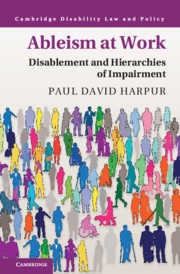Book contents
- Ableism at Work
- Cambridge Disability Law and Policy Series
- Ableism at Work
- Copyright page
- Contents
- Foreword
- Acknowledgements
- 1 Introduction
- 2 International Disability Norms at Work
- 3 The CRPD Committee, Ableism and Hierarchies of Impairment at Work
- 4 Hierarchies of Impairment at Work in the Regulation and Response to Sheltered Work
- 5 The Arbitrary Exclusion of Episodic and Psychosocial Disabilities from Legal Protection
- 6 Ability Apartheid at Work
- 7 Reasonable Accommodations in a Psychosocial Diverse Workplace
- 8 Using Occupational Safety and Health Laws to Promote Psychological Health at Work
- 9 Sanism and Ableism in the Law’s Response to Injured Workers
- 10 Advancing Psychosocial Diversity Using Contract and Unfair Dismissal Laws
- Index
8 - Using Occupational Safety and Health Laws to Promote Psychological Health at Work
Published online by Cambridge University Press: 06 August 2020
- Ableism at Work
- Cambridge Disability Law and Policy Series
- Ableism at Work
- Copyright page
- Contents
- Foreword
- Acknowledgements
- 1 Introduction
- 2 International Disability Norms at Work
- 3 The CRPD Committee, Ableism and Hierarchies of Impairment at Work
- 4 Hierarchies of Impairment at Work in the Regulation and Response to Sheltered Work
- 5 The Arbitrary Exclusion of Episodic and Psychosocial Disabilities from Legal Protection
- 6 Ability Apartheid at Work
- 7 Reasonable Accommodations in a Psychosocial Diverse Workplace
- 8 Using Occupational Safety and Health Laws to Promote Psychological Health at Work
- 9 Sanism and Ableism in the Law’s Response to Injured Workers
- 10 Advancing Psychosocial Diversity Using Contract and Unfair Dismissal Laws
- Index
Summary
OSH laws can hinder persons with disabilities, but they also contain provisions that can be used to promote psychosocial diversity at work. The operation of OSH duties to protect workers’ psychological health requires increased attention following the adoption of the UN Convention on the Rights of Persons with Disabilities (CRPD). The CRPD introduces a new paradigm for analysing international and domestic OSH laws. This chapter argues that if workplace practices followed the psychological health component of OSH laws, then OSH laws change from being a barrier to equality to a means of supporting psychosocial diversity at work. While OSH laws have the potential to promote psychosocial diversity at work, although not appropriately enforced by the state, they also represent a significant roadblock to ability equality. OSH laws require businesses to intervene where manifestations of psychosocial diversity can create actual, probable or perceived risks to health and safety. The failure to appropriately discharge OSH duties for a worker with psychological needs results in that worker with a disability being disadvantaged by the operation of other OSH laws.
- Type
- Chapter
- Information
- Ableism at WorkDisablement and Hierarchies of Impairment, pp. 153 - 179Publisher: Cambridge University PressPrint publication year: 2019

